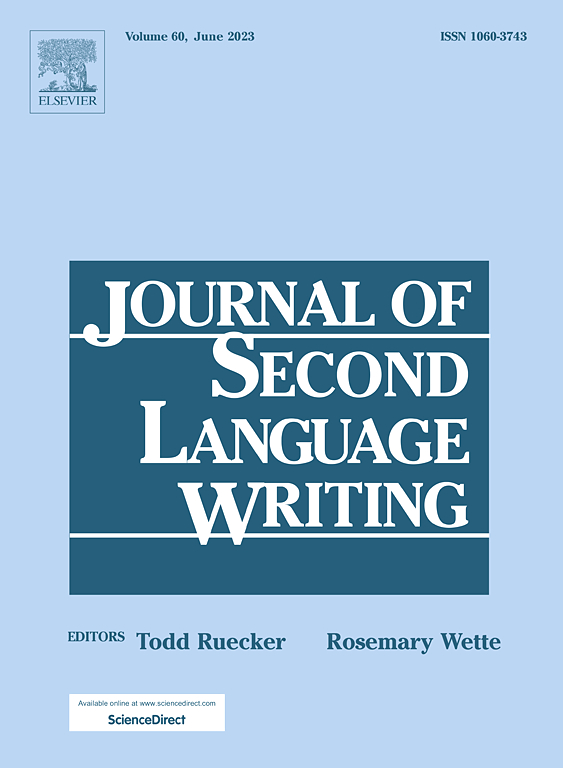An exploration of CFL learners’ metaphor use in second language writing: Effects of genre and topic
IF 4.5
1区 文学
Q1 LINGUISTICS
引用次数: 0
Abstract
This article investigates the effects of genre and topic on the metaphors used by Chinese as a foreign language (CFL) learners’ writing. Using Conceptual Metaphor Theory as the theoretical framework, our study analyzed 900 essays, which include three genres (argumentative essays, narrative essays, and letter writing) and six topics, extracted from the HSK Dynamic Essay Corpus. The results show that both genre and topic influence the use of metaphors by CFL learners, but their effects manifest in different ways. Genre influences the frequency of metaphor due to differences in pragmatic purposes. Specifically, we found that argumentative essays and narrative essays exhibit a notably higher frequency of metaphor use than letter writing. Argumentative essays have a higher frequency than narrative essays. Topic not only affects the frequency of metaphor use but also influences the selection and frequency of classic source domains. Additionally, differences in metaphor frequency across topics are more pronounced in genres with higher metaphor frequency (argumentative essays and narrative essays) and insignificant in a genre with the lowest metaphor frequency (letter writing). Our findings contribute to the further development of conceptual metaphor theory, as well as to the teaching of genre and metaphor in Chinese L2 writing.
对外汉语学习者在二语写作中隐喻使用的探讨:体裁和主题的影响
本文探讨了文体和话题对对外汉语学习者写作中隐喻使用的影响。本研究以概念隐喻理论为理论框架,分析了从HSK动态论文语料库中抽取的900篇论文,包括三种类型(议论文、叙事文章和书信写作)和六个主题。研究结果表明,类型和话题都对英语学习者隐喻的使用有影响,但影响的方式不同。由于语用目的的不同,类型会影响隐喻的使用频率。具体来说,我们发现议论文和叙事性文章比书信中使用隐喻的频率要高得多。议论文比叙事性文章出现的频率更高。主题不仅影响隐喻的使用频率,还影响经典源域的选择和频率。此外,不同主题之间的隐喻频率差异在隐喻频率较高的类型(议论文和叙事文章)中更为明显,而在隐喻频率最低的类型(书信写作)中则不明显。本文的研究结果对概念隐喻理论的进一步发展以及汉语二语写作中体裁和隐喻的教学具有重要意义。
本文章由计算机程序翻译,如有差异,请以英文原文为准。
求助全文
约1分钟内获得全文
求助全文
来源期刊

Journal of Second Language Writing
LINGUISTICS-
CiteScore
8.80
自引率
13.10%
发文量
50
审稿时长
59 days
期刊介绍:
The Journal of Second Language Writing is devoted to publishing theoretically grounded reports of research and discussions that represent a significant contribution to current understandings of central issues in second and foreign language writing and writing instruction. Some areas of interest are personal characteristics and attitudes of L2 writers, L2 writers'' composing processes, features of L2 writers'' texts, readers'' responses to L2 writing, assessment/evaluation of L2 writing, contexts (cultural, social, political, institutional) for L2 writing, and any other topic clearly relevant to L2 writing theory, research, or instruction.
 求助内容:
求助内容: 应助结果提醒方式:
应助结果提醒方式:


